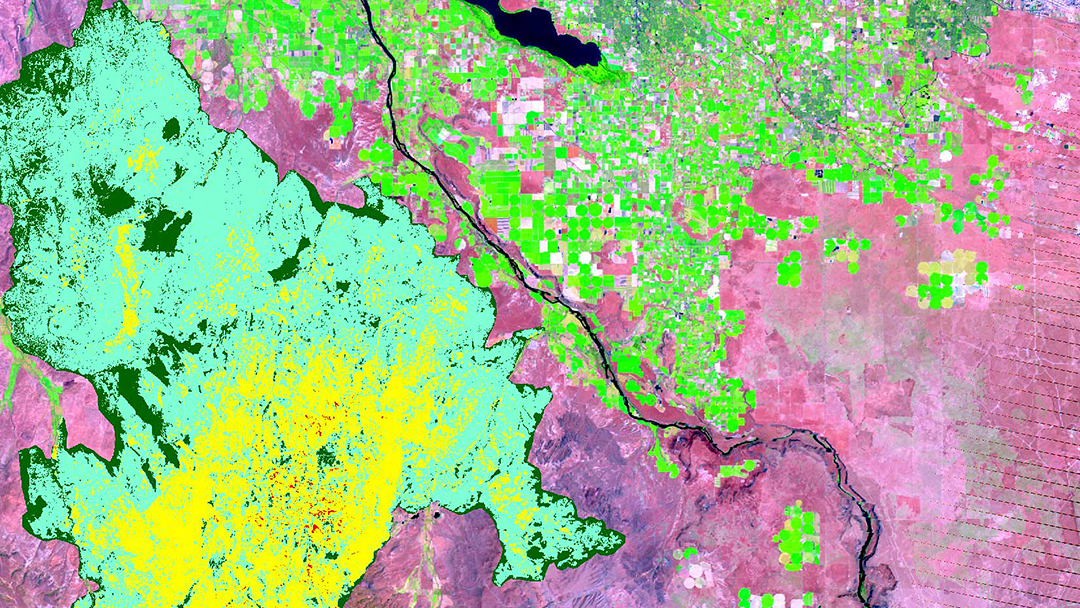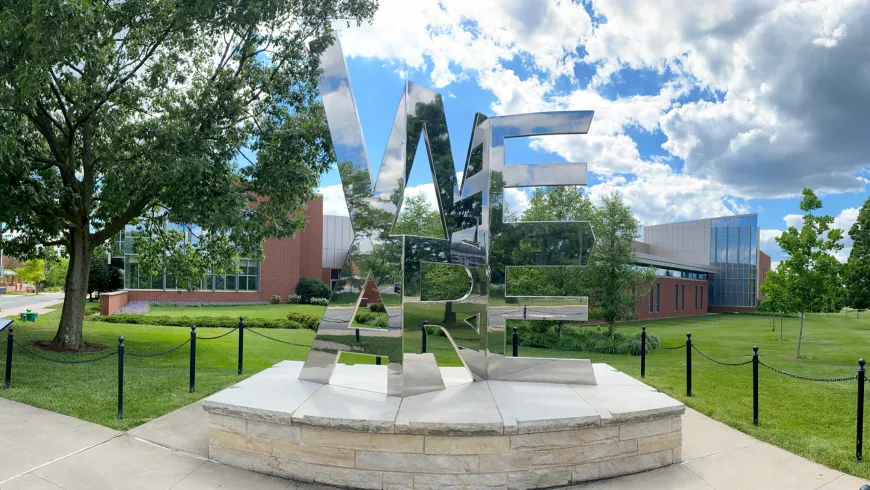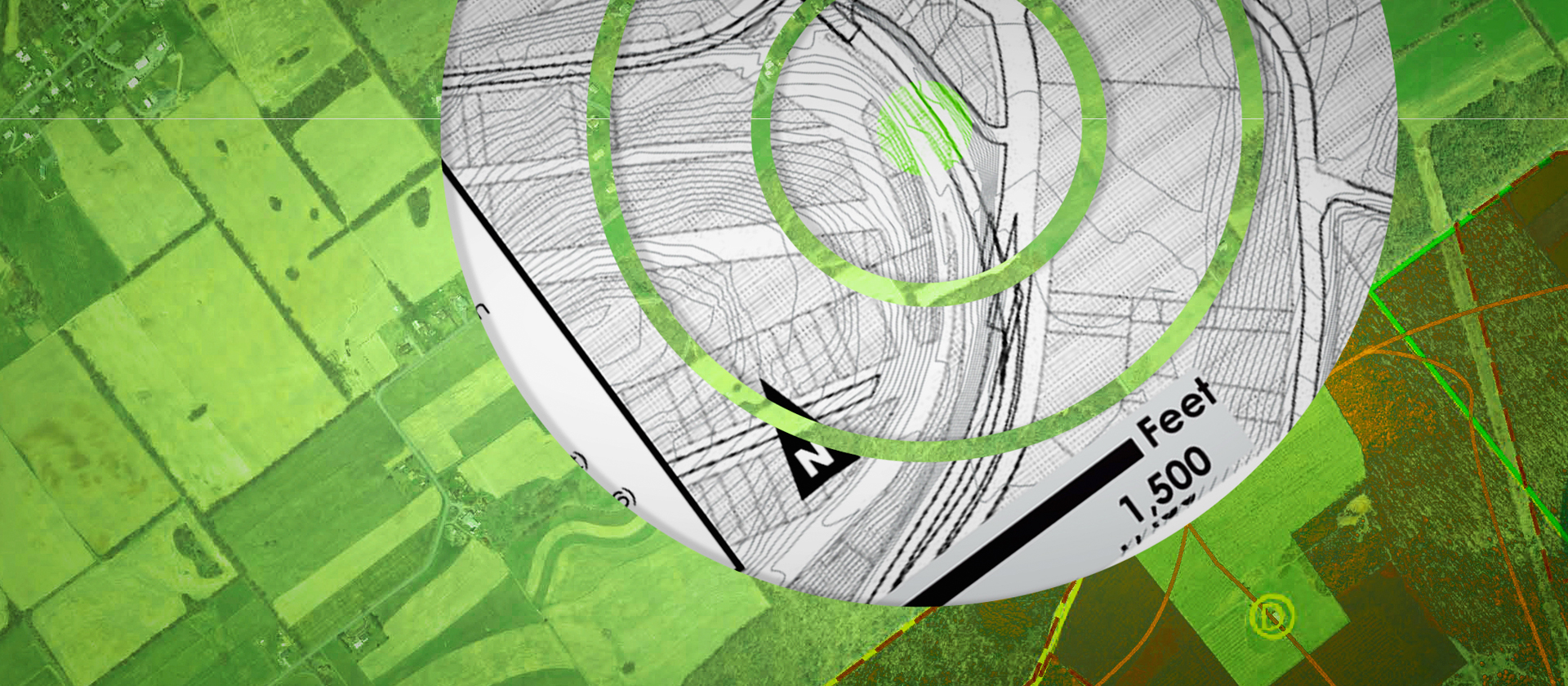100% Online
Complete your Penn State course work at your own pace and 100% online.
Application deadline
Credits and costs
Gain Skills to Influence Major Environmental and Social Change
Identify the cumulative effects of changes in population, climate, and biodiversity and their impacts on food and water.
Understand geographic space in its broadest context, including temporal, cultural, economic, and other social and environmental systems.
Apply key design methodologies specific to geospatial issues, such as systems thinking, and view design as an operations/resources problem.
Combine design with relevant science-based and value-based information to explore alternative solutions from a cross‐disciplinary, decision-driven approach.
Develop and apply ethical frameworks to appropriately evaluate culturally, socially, and economically diverse environments.
Online Geodesign Courses
Online Geodesign Courses
The goal of the 15-credit Graduate Certificate in Geodesign is to provide you with a foundation in geospatially oriented design through investigation of interdisciplinary methods and the collaborative nature of the geodesign process.
The course work required for this certificate can help you learn to:
- perform critical evaluations of specific geodesign model techniques relative to particular environmental and cultural contexts and conditions
- demonstrate knowledge of the multidimensional scope and scale of projects to which geodesign can be applied
- combine design with relevant science-based and value-based information, in a manner that explores alternative solutions from a cross-disciplinary, decision-driven approach
Program Flexibility
Geodesign (GEODZ) courses operate on 7 1/2-week terms. Our geography (GEOG) courses operate on 10-week terms. Two course terms will be offered in the fall and spring and one in the summer. Please see the course schedule for a complete listing of courses being offered
With two sessions being offered in fall and spring, and one session in the summer, some courses may overlap. However, this term structure provides you with the greatest flexibility possible in completing your certificate at your preferred pace.
Required Courses (9 credits)
- 3credits
Students study the theory and principles of geospatially based design by investigating the methods and collaborative nature of the geodesign process.
- Prerequisite
GEOG 482 (Please contact the program to discuss waiving this requirement.)
- 3credits
The principles, inherent values, and practical applications of evaluation and decision models as implemented within the geodesign framework.
- Prerequisite
GEODZ 511
- 3credits
The principles, inherent values, and practical applications of process and impact models as implemented within the geodesign framework.
- Prerequisite
GEODZ 822
- or:3credits
The principles, inherent values, and practical applications of representation and change models as implemented within the geodesign framework.
- Prerequisite
GEODZ 822
Elective Courses (6 credits)
Students are required to take at least 6 credits of geography courses at the 400 level or higher. Based on your experience in geographic information systems, you and your academic adviser will determine which GEOG electives will best meet your needs and interests.
Recommended Elective Courses if No GIS Experience
The following GEOG courses are recommended for those individuals without GIS experience.
- 3credits
Case studies, student investigations, and projects reveal the scope, impact, and character of the Geospatial Revolution.
- 3credits
How geographic information systems facilitate data analysis and communication to address common geographic problems.
- Prerequisite
GEOG 482
Course Availability
If you're ready to see when your courses will be offered, visit our public LionPATH course search (opens in new window) to start planning ahead.
Start or Advance Your Career

Start or Advance Your Career
The geodesign graduate certificate can prepare you to work in a variety of design and planning roles. Demand for the services of professionals in these roles will continue to rise, driven by increasing public demand for more sustainably designed places, smart risk management, and informed environmental justice.
Job Titles Related to This Degree
In this program, you can learn to couple science and evidence-based approaches with the design process, enabling you to become more adept at assessing the impact of designs on people and nature. This will become critical for a variety of roles, including:
- architect
- environmental scientist and specialist
- environmental engineer
- geoscientist
- landscape architect
- geographer
- urban and regional planner
- hydrologist
- natural resource manager
- public health professional
- disaster and security specialist
Career Services to Set You Up for Success

From the day you're accepted as a student, you can access resources and tools provided by Penn State World Campus Career Services to further your career. These resources are beneficial whether you're searching for a job or advancing in an established career.
- Opportunities to connect with employers
- Career counselor/coach support
- Occupation and salary information
- Internships
- Graduate school resources
Ready to Learn More?
Get the resources you need to make informed decisions about your education. Request information on this program and other programs of interest by completing this form.
Ready to take the next step toward your Penn State graduate certificate?
Costs and Financial Aid
Costs and Financial Aid
Learn about this program's tuition, fees, scholarship opportunities, grants, payment options, and military benefits.
Costs and Financial Aid
Graduate Tuition
Graduate tuition is calculated based on the number of credits for which you register. Tuition is due shortly after each semester begins and rates are assessed every semester of enrollment.
2024–25 Academic Year Rates
| How many credits do you plan to take per semester? | Cost |
|---|---|
| 11 or fewer | $1,027 per credit |
| 12 or more | $12,325 per semester |
2025–26 Academic Year Rates
| How many credits do you plan to take per semester? | Cost |
|---|---|
| 11 or fewer | $1,037 per credit |
| 12 or more | $12,448 per semester |
Paying for Your Certificate
Students pursuing a certificate are considered "nondegree," a status that is not eligible for federal student aid, including the Federal Direct Stafford Loan program. A private alternative loan may be an option to consider.
Additionally, Penn State offers many ways to pay for your education, including an installment plan and third-party payments. Penn State World Campus also offers an Employer Reimbursement and Tuition Deferment Plan. Learn more about the options for paying for your education.
Students pursuing a degree and meeting all other eligibility requirements may qualify for financial aid.
Military Benefits
Military service members, veterans, and their spouses or dependents should explore these potential military education benefits and financial aid opportunities, as well.
Additional Cost of Attendance Details
To view the detailed list of cost of attendance elements:
- visit the Tuition Information site
- click the plus sign to expand the table
- select a semester from the World Campus row
Technical Requirements
Review the technical requirements for this program.
Who Should Apply?
Current and aspiring professionals from a variety of backgrounds who are employed in a government agency, business, or nonprofit organization and see the limitations in how regional and urban planning and design challenges are now addressed can benefit from this program.
You must have a bachelor’s degree from an accredited institution to apply.
A Head Start toward a Master's Degree

A Head Start toward a Master's Degree
Not only can this program help create opportunities in your career, it can also give you a solid head start toward a full master’s degree.
Degree Programs Related to This Certificate
In addition to being an excellent stand-alone credential, all of the courses in the Graduate Certificate in Geodesign can be applied toward the following program, if you are accepted into that program:
This flexible online geodesign master’s program is designed to prepare you to address complex environmental design problems. Structure your courses to accommodate your schedule or to complete your degree as quickly as possible.
Learn more about the Master of Professional Studies in GeodesignSet Your Own Pace
Set Your Own Pace
Whether you are looking to finish your program as quickly as possible or balance your studies with your busy life, Penn State World Campus can help you achieve your education goals. Many students take one or two courses per semester.
The geospatial program’s unique structure offers two course terms within the spring and fall semesters. While there may be some overlap between the 7- and 10-week courses, this structure allows you to finish your program requirements faster, often in just one year.
Convenient Online Format
This program's convenient online format gives you the flexibility you need to study around your busy schedule. You can skip the lengthy commute without sacrificing the quality of your education and prepare yourself for more rewarding career opportunities without leaving your home.
A Trusted Leader in Online Education

Penn State has a history of more than 100 years of distance education, and World Campus has been a leader in online learning for more than two decades. Our online learning environment offers the same quality education that our students experience on campus.
Information for Military and Veterans

Are you a member of the military, a veteran, or a military spouse? Please visit our military website for additional information regarding financial aid, transfer credits, and application instructions.
How to Apply to Penn State

How to Apply to Penn State
Apply by January 8 to start January 13
Application Instructions
Deadlines and Important Dates
Complete your application and submit all required materials by the appropriate deadline. Your deadline will depend on the semester you plan to start your courses.
Spring Deadline
Apply by January 8 to start January 13Summer Deadline
Apply by April 27 to start May 19Fall Deadline
Apply by August 3 to start August 25
Applications are accepted on an ongoing basis. Admissions decisions are based on the quality of the applicant's credentials.
The above start dates reflect the earliest possible date that a course may begin for that semester. Most Geodesign courses are 8 weeks in length, allowing students to schedule more than one course per semester. Geodesign course start dates vary.
Steps to Apply
For admission to the Graduate School, an applicant must hold either (1) a baccalaureate degree from a regionally accredited U.S. institution or (2) a tertiary (postsecondary) degree that is deemed comparable to a four-year bachelor's degree from a regionally accredited U.S. institution. This degree must be from an officially recognized degree-granting institution in the country in which it operates.
You should also be comfortable working online and have a strong working knowledge of basic computer software, along with excellent communication skills, a desire to know more about environmental policies, and additional training or experience in geography, engineering, social sciences, urban planning or landscape design if you wish to enroll in the geodesign graduate certificate.
Applying as a Nondegree Graduate Student
Classes may be taken in nondegree-seeking status prior to admission into the graduate certificate in geodesign program. For many students, completing one or more classes prior to applying for the geodesign certificate helps ensure that online learning is the right option.
Applications are submitted electronically and include a nonrefundable application fee. You will need to upload the following items as part of your application:
Official transcripts from each institution attended, regardless of the number of credits or semesters completed. Transcripts not in English must be accompanied by a certified translation. Penn State alumni do not need to request transcripts for credits earned at Penn State, but must list Penn State as part of your academic history. If you are admitted, you will be asked to send an additional official transcript. You will receive instructions at that time.
English Proficiency — The language of instruction at Penn State is English. With some exceptions, international applicants must take and submit scores for the Test of English as a Foreign Language (TOEFL) or International English Language Testing System (IELTS). Minimum test scores and exceptions are found in the English Proficiency section on the Graduate School's "Requirements for Graduate Admission" page. Visit the TOEFL website for testing information. Penn State's institutional code is 2660.
To begin the online application, you will need a Penn State account.
Create a New Penn State Account
If you have any problems during this process, contact an admissions counselor at [email protected].
Please note: Former Penn State students may not need to complete the admissions application or create a new Penn State account. Please visit our Returning Students page for instructions.
You can begin your online application at any time. Your progress within the online application system will be saved as you go, allowing you to return at any point as you gather additional information and required materials.
- Choose Enrollment Type: "Certificate Admission"
- Choose "WORLD CAMPUS" as the campus
Checking Your Status
You can check the status of your application by using the same login information established for the online application form.5. Complete the application.
Admissions Help
If you have questions about the admissions process, contact an admissions counselor at [email protected].
Contact Us

Contact Us
Have questions or want more information? We're happy to talk.
To learn more about the Graduate Certificate in Geodesign, please contact:
World Campus Admissions Counselors
Phone: 814-863-5386
[email protected]
Online Geodesign Program Contact:
David Goldberg, Associate Clinical Professor and Program Director
Geodesign Program Office
College of Arts and Architecture
121 Stuckeman Family Building
University, Park PA 16802-6500
Phone: 814-865-6112
Fax: 814-863-8706
[email protected]
To learn more about the program, visit the program website within Penn State's College of Arts and Architecture.
Learn from the Best
Learn from the Best
The Graduate Certificate in Geodesign is offered in partnership with the College of Arts and Architecture. We create an online learning environment that offers you the same quality education our residential students experience in a face-to-face setting.
Faculty
Janet Silbernagel Balster
- DegreePh.D., Forest Science, Michigan Technological University
- DegreeM.S., Forest Science, Michigan Technological University
- DegreeB.L.A., Landscape Architecture, University of Wisconsin-Madison
Dr. Janet Silbernagel Balster is an adjunct lecturer teaching GEODZ 826: Representation and Change. Janet brings a wealth of practical knowledge and expertise, having worked as a landscape ecologist and landscape architect with the U.S. Forest Service before beginning an academic career that spans more than 25 years. Janet is an emeritus professor of landscape architecture at the University of Wisconsin-Madison. Janet founded Silvernail Studio for Geodesign, LLC. The private practice offers multifaceted services that span professional geographic information system (GIS) map products to landscape conservation strategies and sustainable landscape architectural design.
Kelleann Foster
- DegreeM.L.A., Landscape Architecture and Regional Planning, University of Massachusetts
- DegreeB.S.L.A., Landscape Architecture, Penn State
Kelleann Foster is an active emeritus professor of landscape architecture. She is a proven design leader and invited speaker at many national and international design planning and technology-focused conferences. She is a registered landscape architect whose work is rooted in interdisciplinary and forward-thinking outreach in many respects. Her work advances technologies to communicate alternative scenarios to citizens. She is the author of the Wiley book Becoming a Landscape Architect: A Guide to Careers in Design.
David Goldberg
- DegreeM.L.A., Landscape Architecture, Penn State
- DegreeB.S.L.A., Landscape Architecture, Penn State
David Goldberg is the director of online geodesign programs and associate clinical professor of landscape architecture. David teaches courses in design implementation, building information modeling, site design, and geodesign. His research intentionally sways between tool-centric and topic-centric inquiries, allowing him to be pragmatic in professional practice and aspirational in teaching. He negotiates the role of applied design computing between the academy and the industry. This includes optimizing the physical and virtual environments where teams interact, enhancing interdisciplinary and transdisciplinary collaborations, and developing strategies for virtual learning environments for studio design courses. Topically, he focuses on how landscape architecture incorporates building information modeling and how leveraging big data and near-real-time data creates "digital twins" for landscape architecture — the results of which will be impactful to the practice and discourse of geodesign.
Devin Lavigne
DegreeB.A.A., Urban and Regional Planning, Ryerson Polytechnic UniversityDevin Lavigne is an adjunct lecturer teaching GEODZ 852: Urban/District-Scale Challenges. Devin is a nationally recognized urban planning professional with more than 20 years of experience in urban planning, geodesign, and geographic information systems (GIS). Lavigne is a co-founder of Houseal Lavigne Associates, an award-winning planning and design firm based in Chicago. The firm specializes in community planning, urban design, and economic development, and uses creativity and collaboration to deliver quality solutions.
James Sipes
- DegreeM.L.A., Landscape Architecture, Iowa State University
- DegreeB.L.A., Landscape Architecture, University of Kentucky
James Sipes is an award-winning environmental planner, landscape architect, and writer with more than 30 years of experience encompassing a wide range of design and planning projects. His work includes environmental planning and design, land use planning, watershed management, low-impact development, urban design, cultural resource management, and community-based design. He has received national recognition, having written more than 350 articles for a variety of publications and several books on environmental issues, green infrastructure, and water resources.
Robert Stauder
- DegreeMPS, Community Planning, University of Cincinnati
- DegreeB.A., Spanish, Colorado State University
Robert Stauder is an adjunct lecturer teaching GEODZ 511: Geodesign History, Theory, and Principles. Robert is a geographic information systems (GIS) professional with more than 25 years of experience in geodesign, GIS analysis, and planning. Robert is the GIS analyst/developer for Houseal Lavigne, an award-winning planning and design firm based in Chicago. Prior to joining Houseal Lavigne, Robert was a project manager for Esri, where he worked on and supported projects in the United States, Europe, Africa, and Asia. Robert has experience in using GIS for public engagement, planning, conservation, public safety, and workflow optimization.
News




